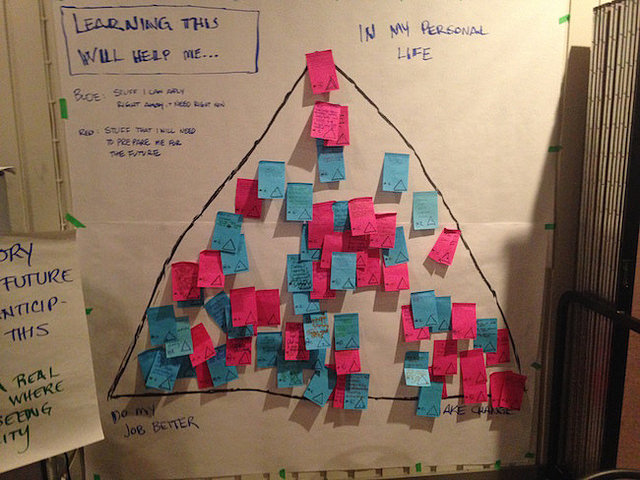A couple of good blog posts in my feed this morning that provoked some thinking. These quotes reminded me how much evaluation and planning is directed towards goals, targets and patterns that cause us to look for data that supports what we want to see rather than learning what the data is telling us about what’s really going on. These helped me to reflect on a conversation I had with a client yesterday, where we designed a process for dealing with this.
Tenneson Woolf, Caitlin Frost and I are snuggled into the attic rooms at the Capitol Hill Mansion B&B in downtown Denver, listening to some jazz, eating some pasta and salad and finishing up a productive design day together. We are preparing to teach the Art of Hosting to 60 leaders from the community at St. John’s in the Wilderness Cathedral in Denver. St. John’s is a high Anglican Gothic Episcopalian cathedral in the heart of Denver. We have been working with the cathedral community over the past couple of years to build the capacity among the 1700 members to be …

Two weeks ago in our Leadership 2020 program I experimented with using a signification framework to harvest a World Cafe. We are beginning another cohort this week and so I had a chance to further refine the process and gather much more information. We began the evening the same way, with a World Cafe aimed at exploring the shared context for the work that these folks are in. Our cohort is made up of about 2/3rds staff from community social services agencies and 1/3 staff from the Ministry of Children and Family Development. This time I used prepared post it notes for …
Two Tim Merry references in a row. Yesterday Tim posted a video blog on planning vs. preparation. It is a useful and crude distinction about how to get ready for action in the complicated vs. complex domains of the Cynefin framework. I left a comment there about a sports metaphor that occurred to me when Tony Quinlan was teaching us about the differences between predictive anticipation (used in the complicated domain) and anticipatory awareness (used in the complex domain). In fact this has been the theme of several conversations today. Complicated problems require Tim’s planning idea: technical skills and expertise, recipes and procedures and …
Just off a call with a potential client today and we were scoping out some of the work that we might do together, with a small organization facing unprecedented change. They are in a place of finally realizing that they are not in control of what is happening to them. They are completely typical in this respect. I am constantly struck by the fact that we have so few skills, frameworks and so little language for dealing with complexity. Clients all the time approach me looking for certainty, answers and clear outcomes. It’s as if they are searching for the …

